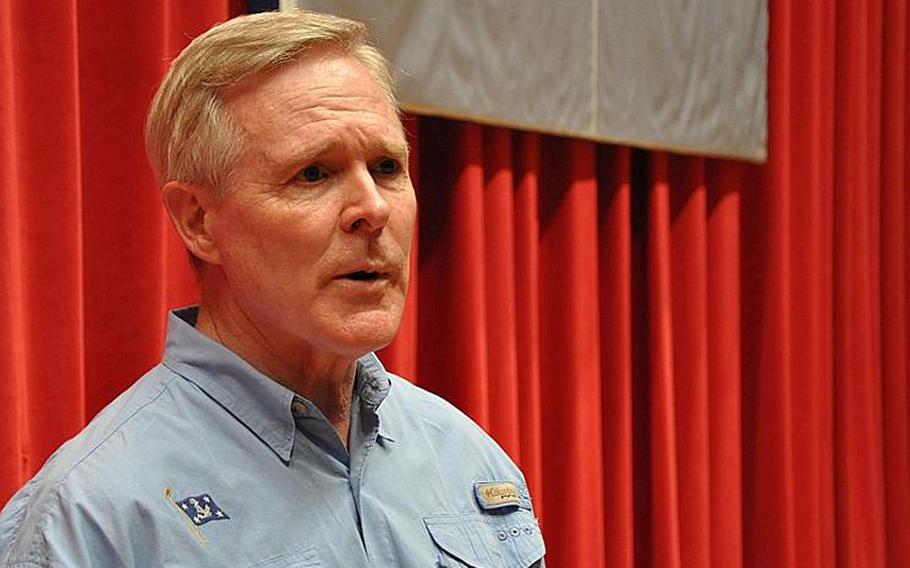
Secretary of the Navy Ray Mabus speaks with sailors at an all-hands meeting at Yokosuka, Japan, on July 16, 2012. Mabus discussed the strategy behind his "green fleet" of ships powered with biofuels, as well as the importance of the Pacific fleet. (Trevor Andersen/Stars and Stripes)
YOKOSUKA NAVAL BASE, Japan — The Navy’s plan to use alternative fuels for half of its fleet by 2020 is proceeding, despite defense bill markups in both houses of Congress that could block all military spending on such forms of power, the service’s top civilian said Monday.
Secretary of the Navy Ray Mabus said he hoped the service ultimately would persuade lawmakers to allow continued purchases of costly biofuels and other energy sources due to unpredictable oil prices and supplies.
“I know we’ve got a lot of support in Congress,” Mabus told Stars and Stripes following a talk with sailors at Yokosuka Naval Base. “People recognize that we’re not doing this for environmental reasons, we’re not doing it because it’s a good thing to do. We’re doing it to remove … one of the biggest vulnerabilities I see for us as a military and as a nation.”
Mabus’ comments come just as the “Great Green Fleet” is presenting the largest display ever of biofueled naval power at the multinational Rim of the Pacific exercise in Hawaii this week.
If the most current versions of the defense bill become law, the Navy may not see another green fleet for a very long time.
The Navy spent $12 million — about $27 per gallon — on 450,000 gallons of fuel mixed from waste cooking oil and algae oil for the demonstration in Hawaii, according to service estimates. Conventional fuel currently costs the Navy $3.60 per gallon, according to a recent Reuters report.
For every $10 increase in a barrel of oil, the Defense Department spends an additional $1.4 billion, according to Phyllis Cuttino, director of the Pew Project on National Security, Energy and Climate, which advocates the Navy’s program. The Navy’s share of such an increase would be about $310 million, according to Senate transcripts.
Over the next three years, the Defense, Energy and Agriculture departments plan to jointly spend $510 million on domestic biofuels in a White House-backed initiative.
Although Mabus and other alternative-energy advocates say producing larger quantities and making technological progress will bring prices down, several key lawmakers have balked at costs much higher than those for petroleum and natural gas.
In May, the House Armed Services Committee added language to the 2013 defense authorization bill preventing the Defense Department from buying anything that costs more than “traditional fossil fuel.”
During a closed-door session in June, the Senate committee counterpart added the same provision to its bill, then blocked the Defense Department from funding biofuel refineries without special authorization.
“Now, look, I love green energy, so I am not against it. It is a matter of priorities,” Rep. Randy Forbes (R-Va.), told Mabus during a hearing in February. “You are not the secretary of energy, you are the secretary of the Navy.”
Forbes said the money would be better spent on more ships and planes, especially given the Navy’s prominent role in the Pentagon’s emerging emphasis on the Asia-Pacific region.
In March, Sen. John McCain (R-Ariz.) compared Mabus’ energy plans with the White House’s past backing of Solyndra, a now-bankrupt solar energy company that received $535 million in federal loan guarantees.
“I don’t believe it’s the job of the Navy to be involved in building ... new technologies,” McCain later told Reuters. “I don’t believe we can afford it.”
Mabus did not explain exactly how he would overcome the congressional markups. However, the Pentagon would likely have to gain support in Congress to either change or delete the spending restrictions in the 2013 defense bill prior to a floor vote or during conference committee, when both houses of Congress reconcile dual bills.
“We are hopeful that during conference proceedings or during floor debate, Congress will reject these amendments,” Cuttino said Monday.
On Monday, Mabus took his case to about 800 sailors gathered at Yokosuka Fleet Theater.
He acknowledged the high costs of biofuels but compared them to the startup costs inherent in other new technologies. Mabus then questioned the reliability of unspecified oil-producing nations.
“We would never let some of these countries that we buy oil and gas from build our ships, our aircraft, our ground vehicles — but we give them a say on whether the ships sail or the aircraft fly or the vehicles operate,” Mabus said. “We’ve got to have a stable, homegrown, American source of fuel.”
Mabus planned to be in Hawaii on Tuesday to observe the USS Nimitz strike group. Other than the nuclear-powered Nimitz, the surface ships and aircraft in the strike group will all be operating on a 50/50 blend of petroleum-based and alternative fuels.